Dispute Resolution Framework for Councils and CCMA
Dispute Resolution by Councils
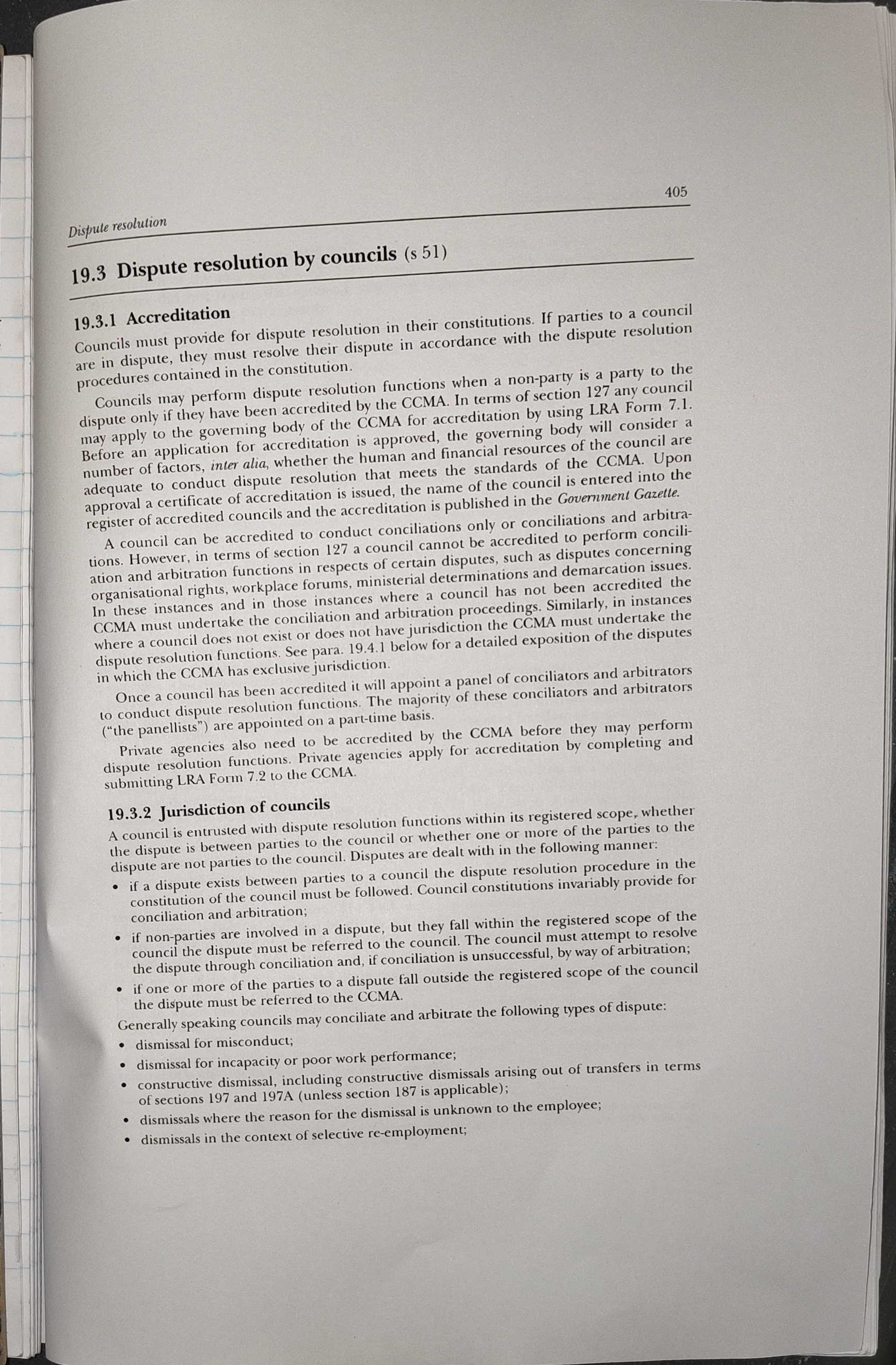
19.3 Dispute resolution by councils (s 51)
19.3.1 Accreditation
-
Definition: Councils must include dispute resolution processes in their constitutions.
- This establishes a formal framework for handling disputes, ensuring compliance and structure.
-
Accreditation Process:
- Councils can perform dispute resolution functions only if accredited by the CCMA.
- Application involves the governing body assessing various factors, including financial and human resources.
- This ensures that councils are equipped to handle disputes effectively.
-
Types of Accreditation:
- Councils can be accredited for conciliations, arbitrations, or both.
- Specialization allows councils to focus on their strengths in dispute resolution.
- Councils can be accredited for conciliations, arbitrations, or both.
-
Conditions of Non-Accreditation:
- If a council hasn’t been accredited, the CCMA must step in for dispute resolution.
- This emphasizes the importance of accreditation for councils to operate effectively.
- If a council hasn’t been accredited, the CCMA must step in for dispute resolution.
19.3.2 Jurisdiction of Councils
-
Scope of Authority:
- Councils handle disputes within their registered scope, regardless of the parties involved.
- Important to understand the delineations of jurisdiction to prevent conflicts and ensure proper authority.
-
Dispute Resolution Procedures:
- If a dispute occurs between parties:
- Follow the dispute resolution procedure as outlined in the council's constitution.
- For disputes involving non-parties:
- Councils must refer disputes they cannot resolve to the CCMA.
- This highlights the role of the CCMA as a superior resolution authority.
- Councils must refer disputes they cannot resolve to the CCMA.
- If a dispute occurs between parties:
Types of Disputes Typically Handled:
-
Dismissal for Misconduct:
- Critical for maintaining workplace discipline and standards.
-
Dismissal for Poor Performance:
- Reflects the importance of performance management in employment.
-
Constructive Dismissal:
- Important to consider scenarios where an employee feels compelled to resign due to employer actions.
-
Dismissals without Employee Knowledge:
- Emphasizes transparency and the need for proper communication in employment decisions.
-
Selective Re-Employment:
- May involve complex issues of fairness and equity in rehiring practices.
Summary:
Dispute resolution by councils encapsulates a structured and regulated approach to handling employment-related disputes through accreditation, defined jurisdiction, and specific types of disputes. Understanding these facets is essential for both employers and employees to navigate conflict resolution effectively.
Extended readings:
Referral of Disputes to Council
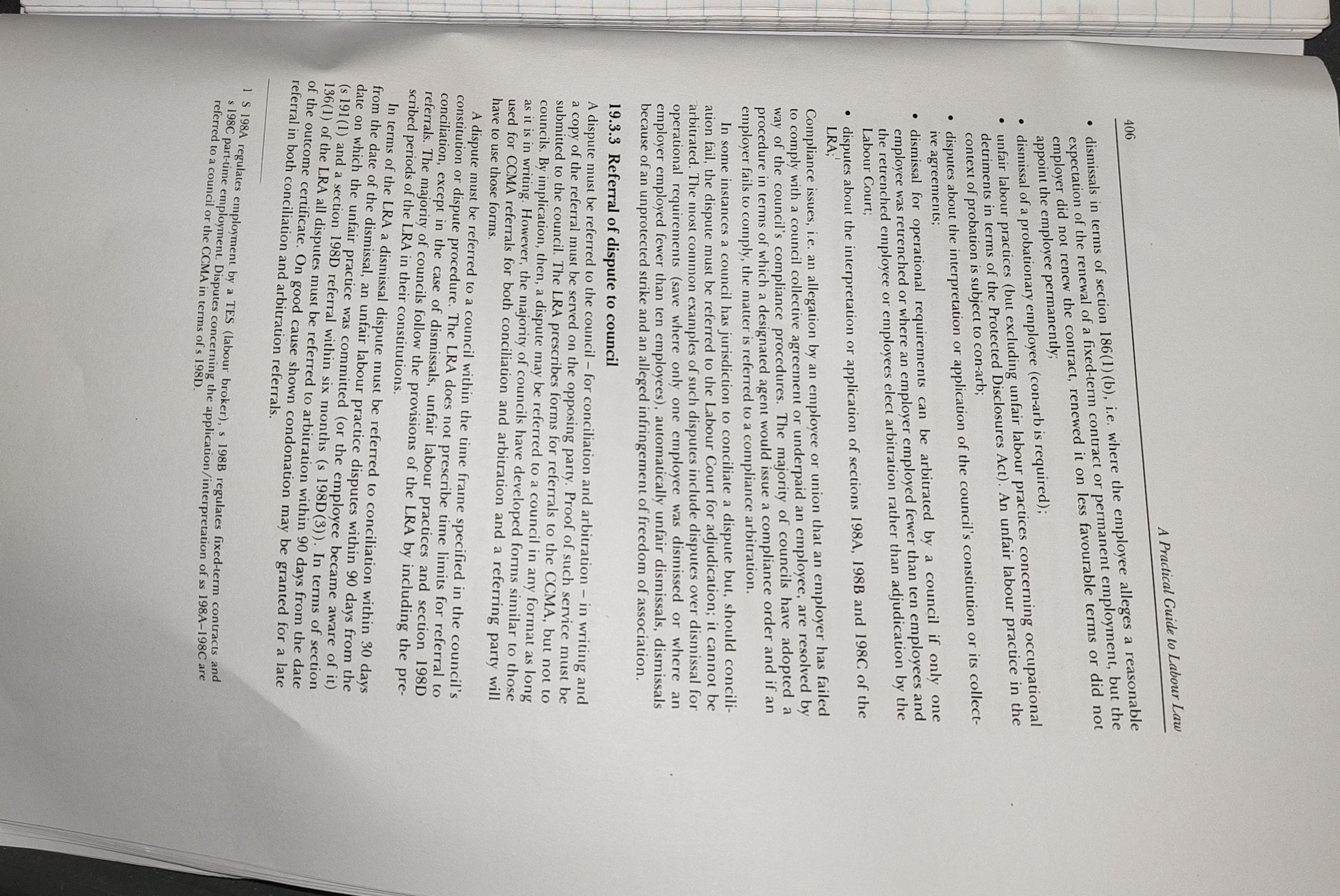
Key Points
-
Referral Process: The text discusses the referral of employee disputes to a council, outlining the procedural steps for addressing allegations of unfair treatment or non-compliance by employers.
- Thoughts: It's crucial for both employers and employees to understand the referral process to ensure disputes are handled fairly and efficiently.
- Additional Information: Knowledge of the specific rights and responsibilities within this process can empower employees to seek redress effectively.
-
Timeline and Requirements: The council's timeline must be adhered to, meaning disputes should be referred within specified timeframes.
- Thoughts: Timeliness in referrals emphasizes the importance of acting quickly in employment disputes to avoid losing the right to address grievances.
- Additional Information: A failure to adhere to these time limits might result in dismissal of the case or loss of rights to pursue issues formally.
-
Consultation and Preparation: The text emphasizes the importance of preparing for the council meetings and understanding the regulations governing employment.
- Thoughts: Preparation is key in legal processes. Employees should gather evidence and understand their position before attending hearings.
- Additional Information: Engaging legal support or advice can enhance preparation quality and lead to better outcomes in dispute resolutions.
-
Rights Protection: The council aims to protect employees' rights against unfair treatment by employers.
- Thoughts: This serves as a reminder of the protections employees have, which can potentially balance power dynamics in the workplace.
- Additional Information: Understanding these rights can help employees feel more secure in voicing concerns and claims.
Summary
The image discusses the protocol for referring employment disputes to a council, detailing the necessary steps, timelines, and protections afforded to employees. Understanding these processes is vital for ensuring fair treatment in the workplace and securing one's rights.
Extended readings:
Dispute Resolution and CCMA Jurisdiction
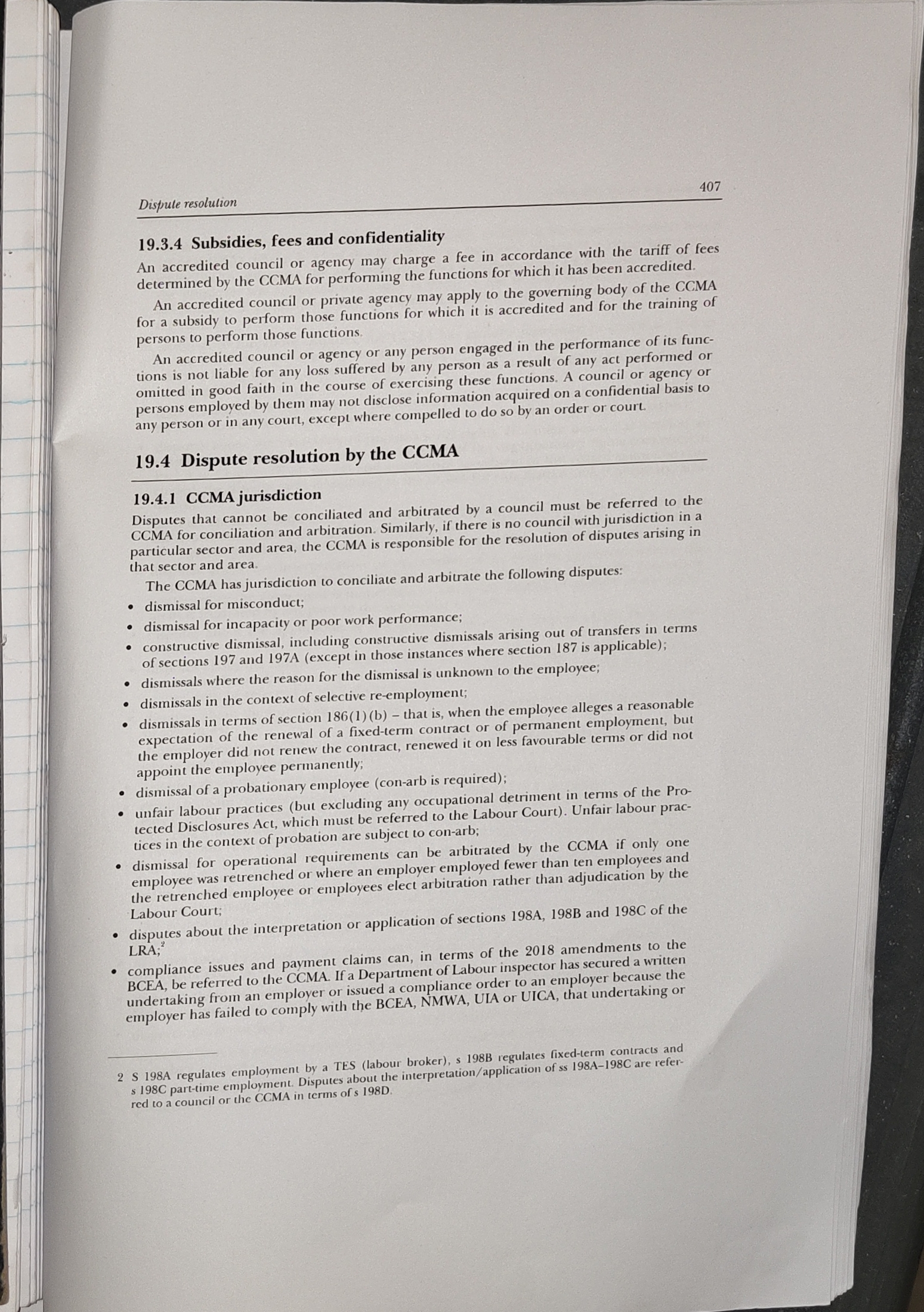
19.3.4 Subsidies, Fees, and Confidentiality
-
Fees for Services: Accredited councils or agencies can charge fees according to the CCMA's tariff for functions performed.
- Thoughts: This structure allows for regulated compensation for services provided in dispute resolution, ensuring that costs are transparent and standardized across agencies.
-
Application for Subsidy: Accredited agencies may apply for subsidies to perform functions they are accredited for.
- Additional Information: This might promote accessibility for smaller organizations or agencies serving underfunded communities.
-
Liability and Confidentiality: Agencies are not liable for losses incurred while performing accredited functions in good faith and must keep information confidential unless compelled to disclose it by court order.
- Thoughts: This clause protects both the agency and the individuals involved in disputes, fostering trust in the dispute resolution process.
19.4 Dispute Resolution by the CCMA
19.4.1 CCMA Jurisdiction
- Dispute Resolution Scope: Disputes that cannot be resolved at the council level must be referred to the CCMA.
- Thoughts: This centralizes dispute resolution, allowing for a consistent approach across various sectors.
Types of Disputes the CCMA Can Handle:
| Type of Dispute | Description |
|---|---|
| Dismissal for misconduct | Involves termination due to employee misbehavior or violation of policies. |
| Dismissal for incapacity or poor work performance | Addresses cases where the employee fails to meet job standards or is unable to perform due to incapacity. |
| Constructive dismissal | Covers situations where an employee feels forced to resign due to employer actions. |
| Dismissals related to fixed-term employment | Concerns situations where an employee alleges reasonable expectations regarding contract renewals were violated. |
| Selective re-employment | Pertains to employees alleging unfair treatment in re-employment situations. |
| Dismissal of probationary employees | Addresses the termination of employees still under probationary status. |
| Unfair labor practices | Matters that should be referred to the Labour Court, emphasizing employee rights and protections. |
| Dismissals for operational requirements | Involves layoffs or dismissals due to business needs, particularly in small companies (<10 employees). |
| Compliance issues with labor regulations | Allows for disputes arising from violations of the BCEA or related labor laws. |
- Additional Information: Each type of dispute highlights the various grounds under which employees can seek resolution, ensuring a broad spectrum of workplace-related issues are addressed.
Compliance and Labor Inspector Involvement
-
Compliance Claims: If a labor inspector confirms claims against an employer regarding labor laws, these can also be referred to the CCMA.
- Thoughts: This demonstrates the collaborative nature of labor enforcement, where different bodies can work together to protect workers' rights.
-
Additional Information: It emphasizes the importance of legal frameworks in ensuring fair treatment within the workplace and the ease of access for employees seeking redress.
Extended readings:
A Practical Guide to Labour Law
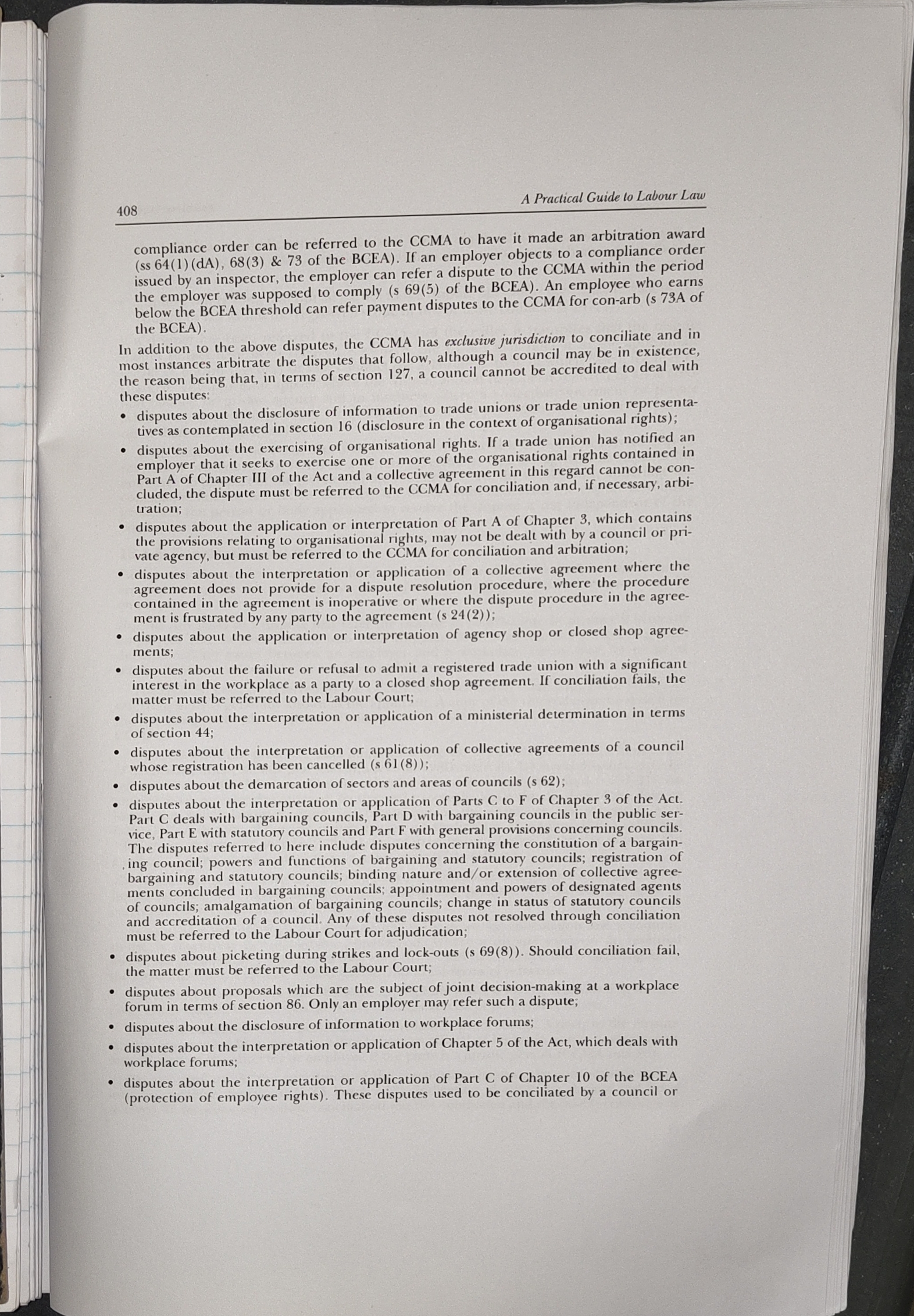
-
CCMA's Role in Dispute Resolution
- The CCMA (Commission for Conciliation, Mediation and Arbitration) has exclusive jurisdiction to arbitrate certain disputes.
- In cases of compliance order disputes, employers have specific time frames to refer matters to the CCMA, emphasizing the importance of timely actions in labor disputes.
-
Types of Disputes Subject to CCMA
- The document lists several specific disputes that the CCMA can handle:
- Disclosure of Information: Disputes regarding the sharing of information with trade unions or representatives, highlighting the significance of transparency in organizational practices.
- Organizational Rights: Issues surrounding the exercise of organizational rights must be addressed through the CCMA, reinforcing the notion that employees have protections for their representation.
- Agency Shop Agreements: Clarification on the interpretation of agency shop agreements or closed shop agreements indicates complexities in labor contracts that often require mediation.
- The document lists several specific disputes that the CCMA can handle:
-
Ministerial Determinations
- Disputes involving ministerial determinations under section 44 stress the interplay between governmental regulations and labor relations, suggesting that employers must be aware of legal frameworks affecting their operations.
-
Bargaining Councils
- The document mentions various types of disputes related to bargaining councils, including:
- Establishment, powers, and functions of councils.
- Registration of councils and collective agreements.
- This highlights the structured nature of labor negotiations within specific sectors, reinforcing the idea that organized representation is vital for collective bargaining.
- The document mentions various types of disputes related to bargaining councils, including:
-
Picketing and Strikes
- Issues related to picketing during strikes indicate the legal considerations necessary for labor actions, suggesting that peaceful assembly is a regulated activity that requires compliance with labor laws.
-
Decision-making in Workplaces
- The notes on disputes subject to joint decision-making at workplace forums point to employer responsibilities in management practices, stressing the need for inclusive decision-making which can lead to smoother labor relations.
| Type of Dispute | Reference |
|---|---|
| Disclosure of information to trade unions | Section 16 |
| Exercising organisational rights | Section 69(5) |
| Application of Part A of Chapter 3 | Specific provisions |
| Agency shop or closed shop agreements | General provisions |
| Failure to admit or refuse a registered trade union | Labour Court |
| Bargaining council disputes | Various sections |
| Picketing during strikes and lock-outs | Section 69(8) |
| Joint decision-making at workplace forums | Section 86 |
- Conclusion
- Understanding the various disputes that can arise in labor relations and the processes for addressing them is essential for both employers and employees. Compliance with these legal frameworks not only protects rights but also fosters better workplace environments.
Extended readings:
Dispute Resolution Notes
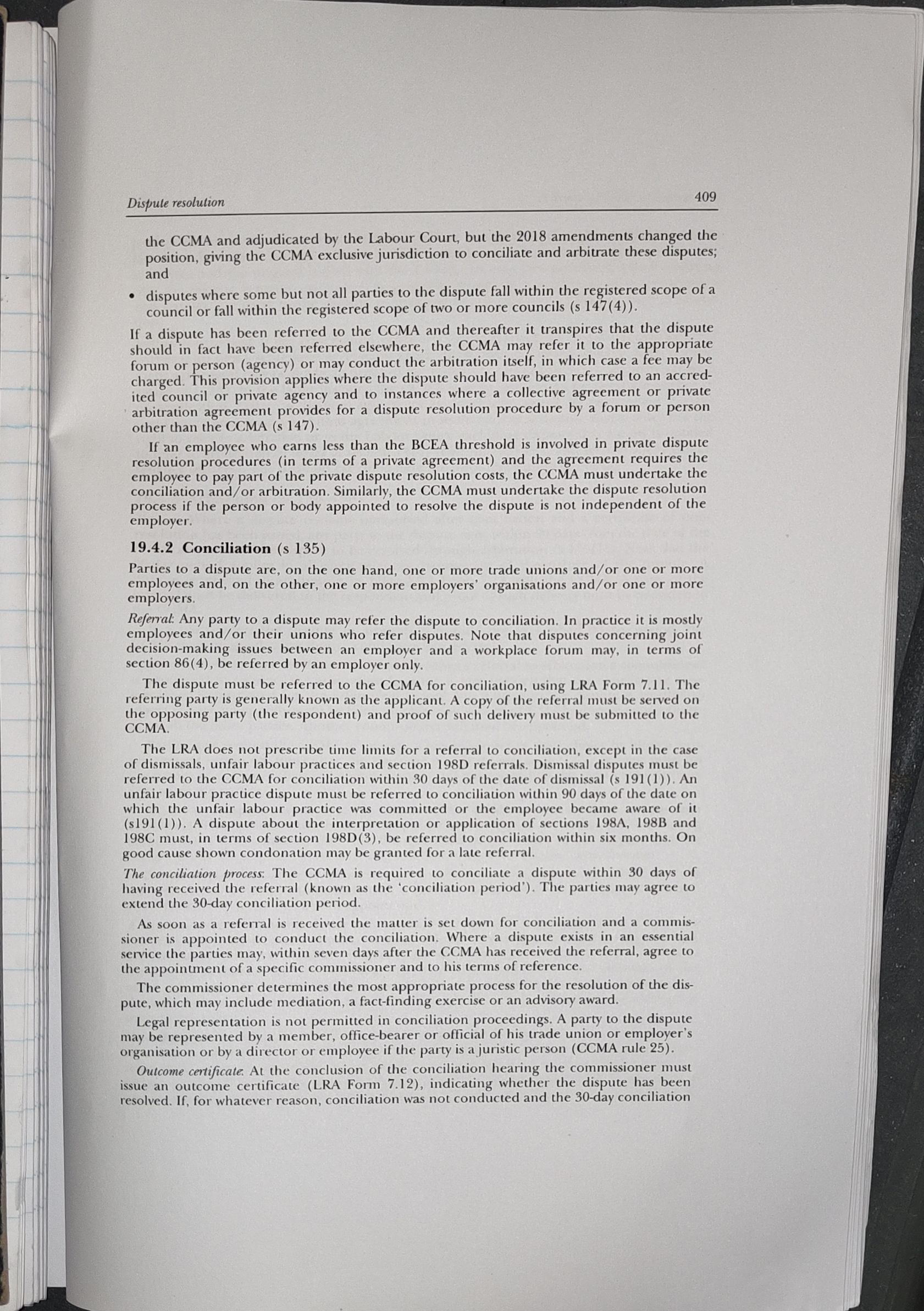
Key Points
-
CCMA Jurisdiction
- The CCMA (Commission for Conciliation, Mediation and Arbitration) has exclusive jurisdiction to conciliate and arbitrate disputes, as per the 2018 amendments.
- Thoughts: This exclusivity simplifies the dispute resolution process, ensuring a more streamlined approach but also means employers and employees must comply with CCMA processes.
-
Referral of Disputes
- If a dispute is referred to the CCMA and later recognized as needing another forum, the CCMA can redirect the matter.
- Additional Info: This highlights the flexibility within the dispute resolution framework, allowing for appropriate channels based on the nature of the dispute.
-
Private Dispute Resolution Costs
- Employees earning below the BCEA (Basic Conditions of Employment Act) threshold cannot be charged for private dispute resolution costs. The CCMA is responsible for costs if it undertakes resolution on behalf of these employees.
- Implications: This protects low-income employees from bearing the financial burden of dispute resolutions, promoting equitable access to legal services.
-
Conciliation Process (LRA Section 135)
- Conciliation involves one or more trade unions and/or employers, where disputes should ideally be referred by the involved parties.
- Idea: Early referral and collaboration between unions and employers can lead to faster resolutions, preventing lengthy arbitration processes.
-
Time Limits for Referral
- Dismissal disputes must be referred to the CCMA within 30 days. Other types of disputes can be referred within 90 days of a relevant event.
- Key Consideration: Timeliness in referrals is crucial to securing favorable outcomes and avoiding delays that can exacerbate workplace tensions.
-
Commissioner’s Role
- A commissioner appointed by the CCMA manages the conciliation process and may employ various methods to resolve disputes, such as fact-finding or advisory roles.
- Importance: The commissioner plays a vital role in maintaining neutrality and ensuring fair process, which is essential for trust in dispute resolution.
-
Legal Representation
- Legal representation is not allowed during conciliation proceedings; parties may represent themselves or use non-lawyer representatives.
- Reflection: This promotes accessibility, although it may pose challenges for employees unfamiliar with legal proceedings.
-
Outcome Certificate
- At the conclusion of the conciliation hearing, an outcome certificate is issued, indicating whether conciliation was unsuccessful or if the dispute was resolved.
- Significance: This certificate is crucial for potential further legal action, providing a record of attempts made to resolve the dispute amicably.
Summary
The document outlines the procedures and regulations surrounding dispute resolution through the CCMA, emphasizing its exclusive jurisdiction, the role of conciliation, timelines for referrals, and protections for employees. Understanding these aspects helps stakeholders navigate labor disputes effectively.
Extended readings:
A Practical Guide to Labour Law: Arbitration and Dispute Resolution
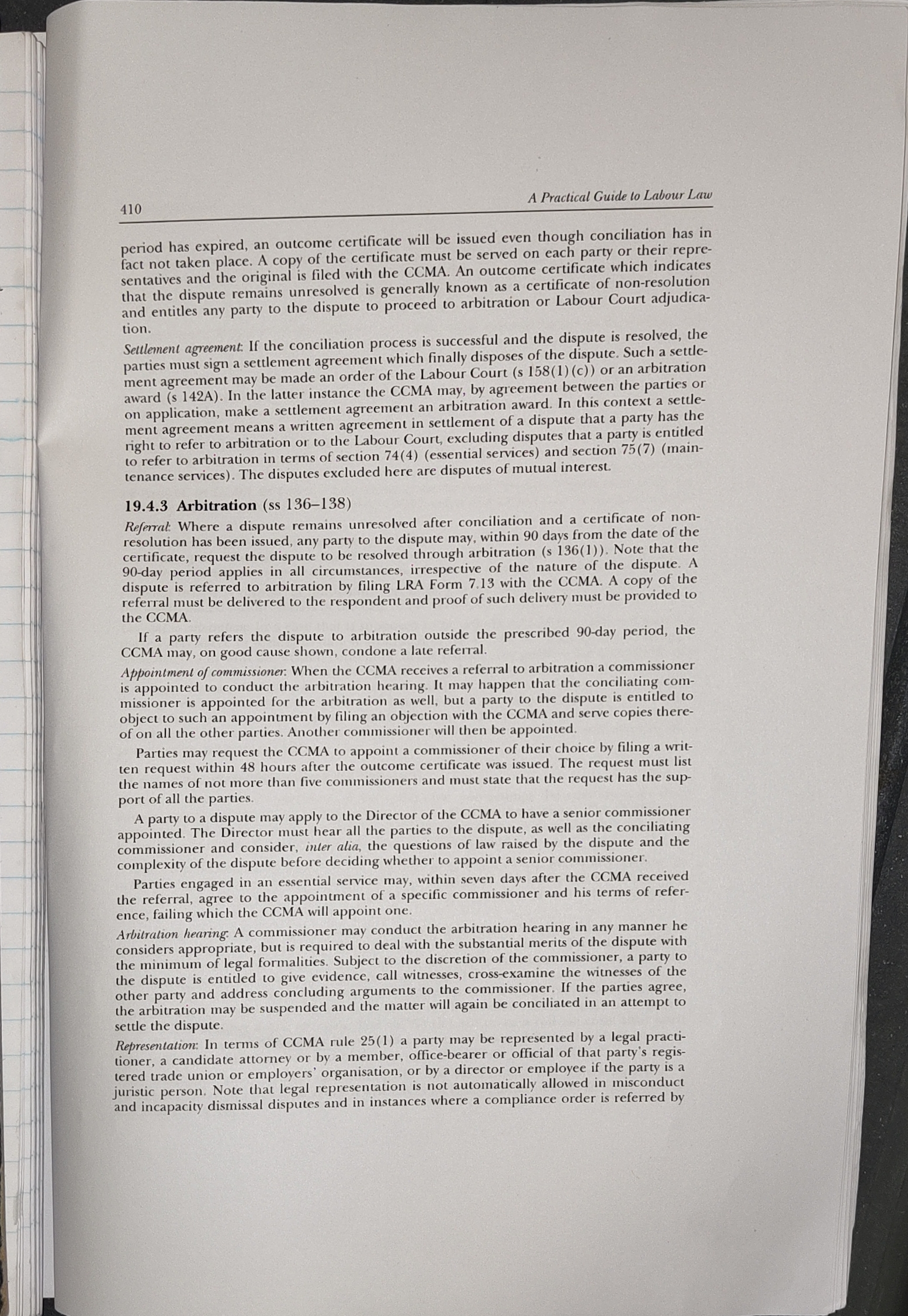
Outcome Certificate
- An outcome certificate will be issued if conciliation fails, even if the period for resolution has expired.
- Thoughts: This ensures that parties can proceed to arbitration or Labour Court without unnecessary delays.
- Additional Information: The certificate must be served to both parties, and the original is filed with the CCMA (Commission for Conciliation, Mediation and Arbitration).
Settlement Agreement
- If the conciliation process is successful, a settlement agreement is signed to resolve the dispute.
- Thoughts: This emphasizes the importance of reaching an agreement amicably.
- Additional Information: This agreement can be made an order of the Labour Court or an arbitration award depending on the situation.
Arbitration Overview (Sections 136-138)
- Referral Process: Disputes unresolved after conciliation must be referred for arbitration within 90 days of the outcome certificate.
- Thoughts: Timely referral is critical to ensure disputes are resolved efficiently.
- Additional Information: A copy of the referral must be submitted using LRA Form 7.13 to the CCMA.
Appointment of Commissioner
- CCMA appoints a commissioner when receiving a referral for arbitration.
- Thoughts: Having an appointed commissioner provides a neutral party to facilitate the process.
- Additional Information: Parties can request a specific commissioner within 48 hours post-certification.
Arbitration Hearing
- The commissioner conducts the hearing, addressing the merits of the dispute with minimal legal formality.
- Thoughts: This allows for a more accessible process for parties involved.
- Additional Information: Parties are allowed to present evidence and arguments, but the commissioner maintains control over the hearing.
Representation Rights
- Involves CCMA Rule 25(1), allowing legal representation under certain conditions.
- Thoughts: This brings clarity to who can represent parties during hearings, ensuring stakeholders are properly supported.
- Additional Information: Legal representation is not automatically allowed for all types of disputes; specific conditions apply.
Key Points on Essential Services
- Parties engaged in essential services have additional stipulations regarding commissioners.
- Thoughts: Such provisions protect essential service operations while ensuring fair arbitration.
- Additional Information: These parties have a specific timeline (seven days post-referral) to request a particular commissioner.
Extended readings:
Dispute Resolution and Arbitration Procedures
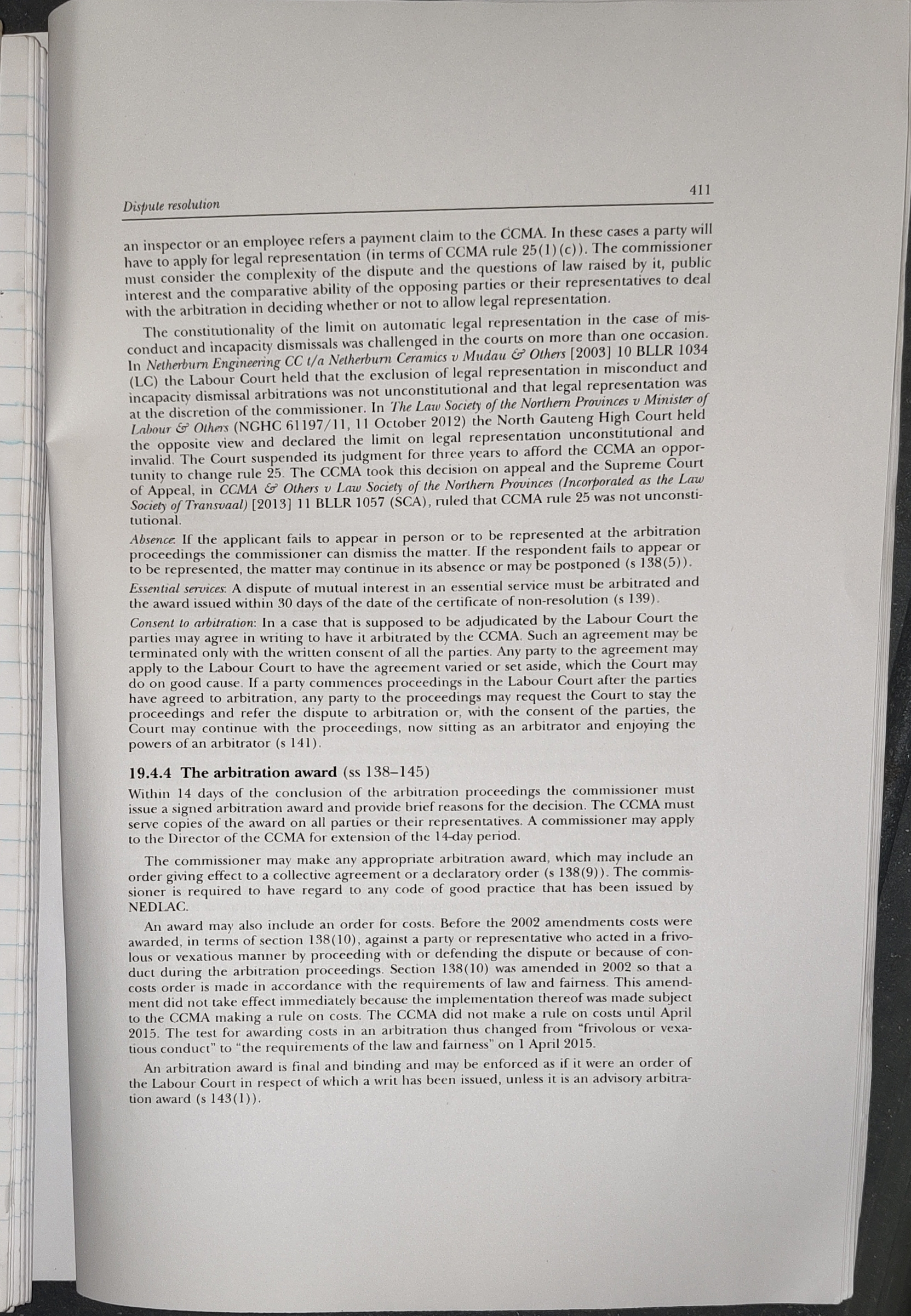
Key Points
Legal Representation in Disputes
- Context: The CCMA allows parties to apply for legal representation depending on the complexity of the case.
- Implication: This suggests that not all disputes warrant legal representation, indicating a need for parties to assess their situation carefully.
Case Law Reference
- Netherburn Engineering CC Case: The exclusion of legal representation in incapacity dismissals was deemed unconstitutional.
- Thoughts: This ruling underscores the importance of legal representation in safeguarding fair processes, particularly in serious matters like dismissal for misconduct or incapacity.
Absence of Parties in Arbitration
- Absence Clause: If a party fails to attend arbitration, the commissioner has the discretion to dismiss the matter.
- Additional Information: This emphasizes the importance of participation in arbitration proceedings, highlighting that non-attendance could negate a party’s opportunity for resolution.
Essential Services and Arbitration
- Essentials Definition: The document mentions that critical services must be arbitrated.
- Consideration: Understanding what qualifies as essential can impact how disputes are resolved in sectors vital to public interest, such as healthcare or utilities.
Continuation of Proceedings
- Court's Role: The Labor Court can order arbitration or continue proceedings based on agreements between parties.
- Reflection: Knowing the potential for court involvement may influence how parties approach negotiation and dispute resolution strategies.
Arbitration Award Regulations
- Issuance Timeline: The commissioner has 14 days post-proceedings to issue an award.
- Significance: Timely awards are crucial in ensuring that disputes are resolved without unnecessary delay, which can affect business operations.
Amendment on Costs
- Previous vs. New Standards: Changes to cost awards reflect a move towards more equitable treatment in arbitration cases.
- Insight: This shift towards a more structured approach to awarding costs may encourage parties to engage more thoughtfully in the arbitration process, knowing the risks of frivolous claims.
Finality of Awards
- Binding Nature: Arbitration awards are final and can be enforced like court orders.
- Implication: This finality emphasizes the need for due diligence before entering arbitration, as the outcomes carry significant weight.
Additional Notes
- NEDLAC: Reference to good practices indicates a broader framework guiding dispute resolution in South Africa.
- Reflection: Being aware of these practices can aid in mitigating disputes and fostering more collaborative negotiations between parties.
Extended readings:
Notes on Arbitration and Powers of CCMA Commissioners
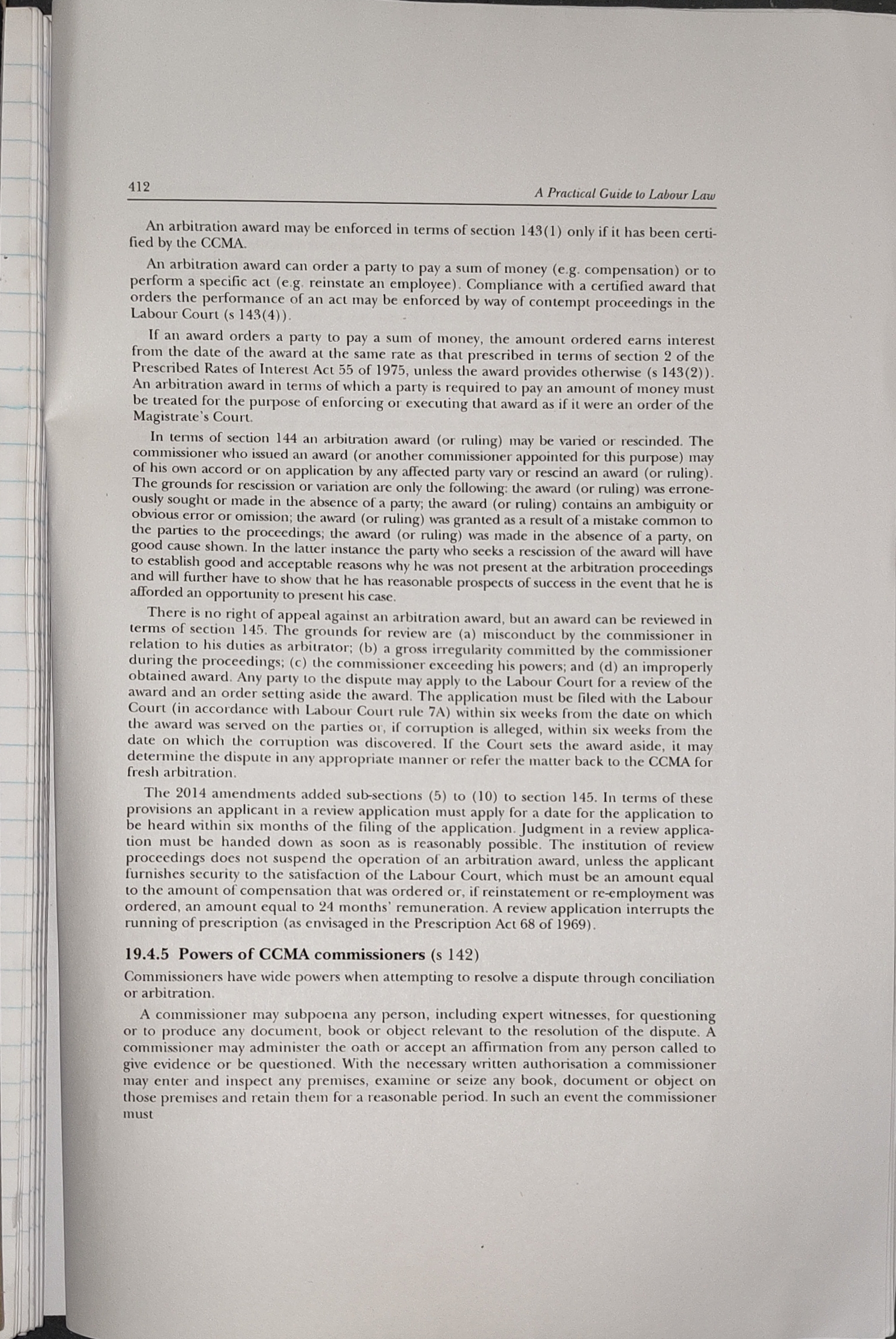
Arbitration Award Enforcement
- Section 143(1) Compliance: An arbitration award may be enforced only if certified by the CCMA. This emphasizes the importance of the CCMA's role in formalizing the arbitration process.
- Thoughts: Understanding the enforcement mechanism is crucial for ensuring compliance and avoiding disputes on the validity of awards.
Interest on Awards
- Interest Accrual: If an award mandates payment of a sum, interest is earned from the date of the award at rates prescribed under the Prescribed Rates of Interest Act 55 of 1975, unless stated otherwise.
- Additional Info: This highlights financial implications of delays in payment and the legal protections available to parties receiving awards.
Variation and Rescission of Awards
- Section 144 Conditions: Awards may be varied or rescinded under specific conditions, including mistakes in the award, absence of parties, or significant procedural errors.
- Thoughts: This allows for corrections, ensuring fairness and adaptability in the arbitration process, which is vital in labor relations.
Review of Arbitration Awards
- Section 145 Review: While appeals are not permitted, reviews can be requested for misconduct, irregularities, or misconduct by the commissioner.
- Important Note: The time frame for filing a review is critical (within six months of award notification), which requires timely awareness of actions taken during arbitration.
Powers of CCMA Commissioners (Section 142)
- Commissioners' Authority: They can subpoena persons, investigate premises, and question individuals to gather evidence relevant to a dispute.
- Thoughts: This authority enables a thorough investigation and resolution of disputes, reinforcing the commissioners' role as impartial adjudicators.
Summary Table
| Section | Topic | Details |
|---|---|---|
| 143(1) | Award Enforcement | An award enforced only if certified by CCMA. |
| Interest | Interest on Awards | Interest accrues from the award date as per prescribed rates. |
| 144 | Variation/Rescission | Awards may be changed under set conditions (errors, absence, etc.). |
| 145 | Review Process | Reviews for misconduct or irregularities must be filed within six months. |
| 142 | Powers of Commissioners | Subpoena, inspect premises, and question parties involved in disputes. |
These notes encapsulate key aspects of arbitration and the powers wielded by CCMA commissioners, which are critical for understanding labor dispute resolution in South Africa.
Extended readings:
Dispute Resolution Notes
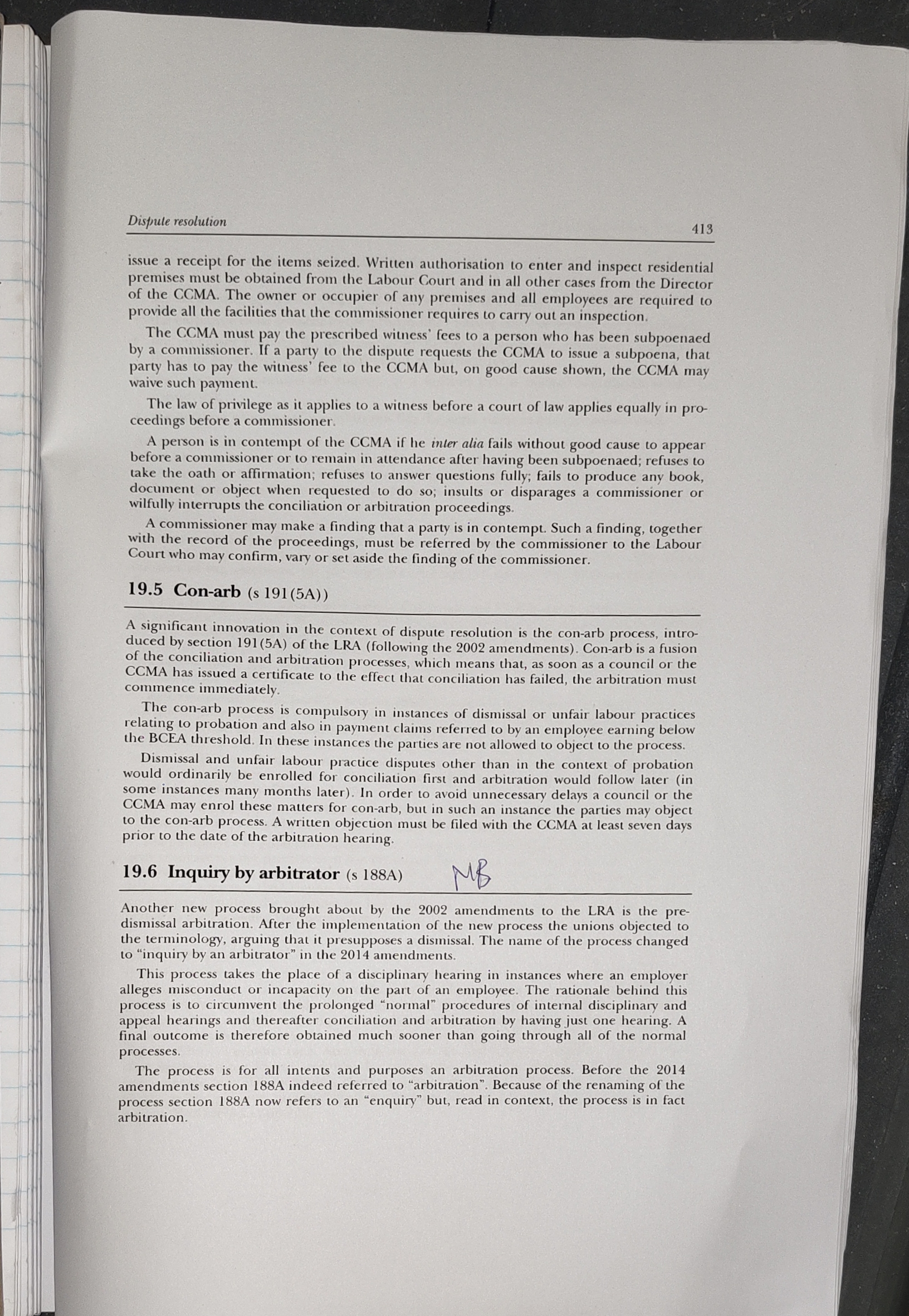
Subpoenas and Witness Fees
-
Witness Fees: The CCMA must pay prescribed witness fees to those subpoenaed. A party requesting a subpoena must pay this fee unless the CCMA waives it. This highlights the CCMA's commitment to administering fair processes by ensuring financial barriers don’t impede access to justice.
-
Privilege and Contempt: The law of privilege applies equally in CCMA proceedings. Failure to comply with CCMA requests (like attending or answering questions) can lead to contempt findings, reinforcing the seriousness of participation in the dispute resolution process.
Con-arb Process (s 191(5A))
-
Innovation in Dispute Resolution: The con-arb process merges conciliation and arbitration into a single session, aiming for efficiency. This approach allows disputes regarding dismissals or unfair labor practices to be resolved swiftly.
-
Certificate of Conciliation: If conciliation fails, the CCMA issues a certificate prompting immediate arbitration, which speeds up resolutions. This is beneficial for employees and employers as it reduces prolonged disputes.
-
Objections: A written objection to the con-arb process must be submitted at least seven days before the arbitration hearing. This stipulation provides clarity and structure, ensuring all parties are prepared before the hearing.
Inquiry by Arbitrator (s 188A)
-
Change in Terminology: The introduction of the term "inquiry by an arbitrator" emphasizes a process that may not necessarily indicate a dismissal, addressing concerns from unions regarding implications of dismissal.
-
Efficiency: This process aims to streamline the resolution of disputes involving employee misconduct or incapacity, reducing the duration and complexity of the hearing process. It can lead to swifter resolutions compared to traditional internal procedures which can often prolong disputes unnecessarily.
Summary of Key Concepts
- Importance of Witness Participation: Ensuring that witnesses are present and compliant facilitates the smooth operation of dispute resolution.
- Efficiency of Con-arb: The con-arb process is designed to expedite resolutions, benefiting both employees and employers by eliminating redundancy.
- New Inquiry Process: The inquiry process suggests a shift towards more efficient, focused hearings, reflecting an adaptation to contemporary labor relations challenges.
These notes encapsulate significant procedural insights that stakeholders should be aware of when navigating labor disputes through the CCMA.
Extended readings:
Notes on Inquiry by an Arbitrator and Labour Court
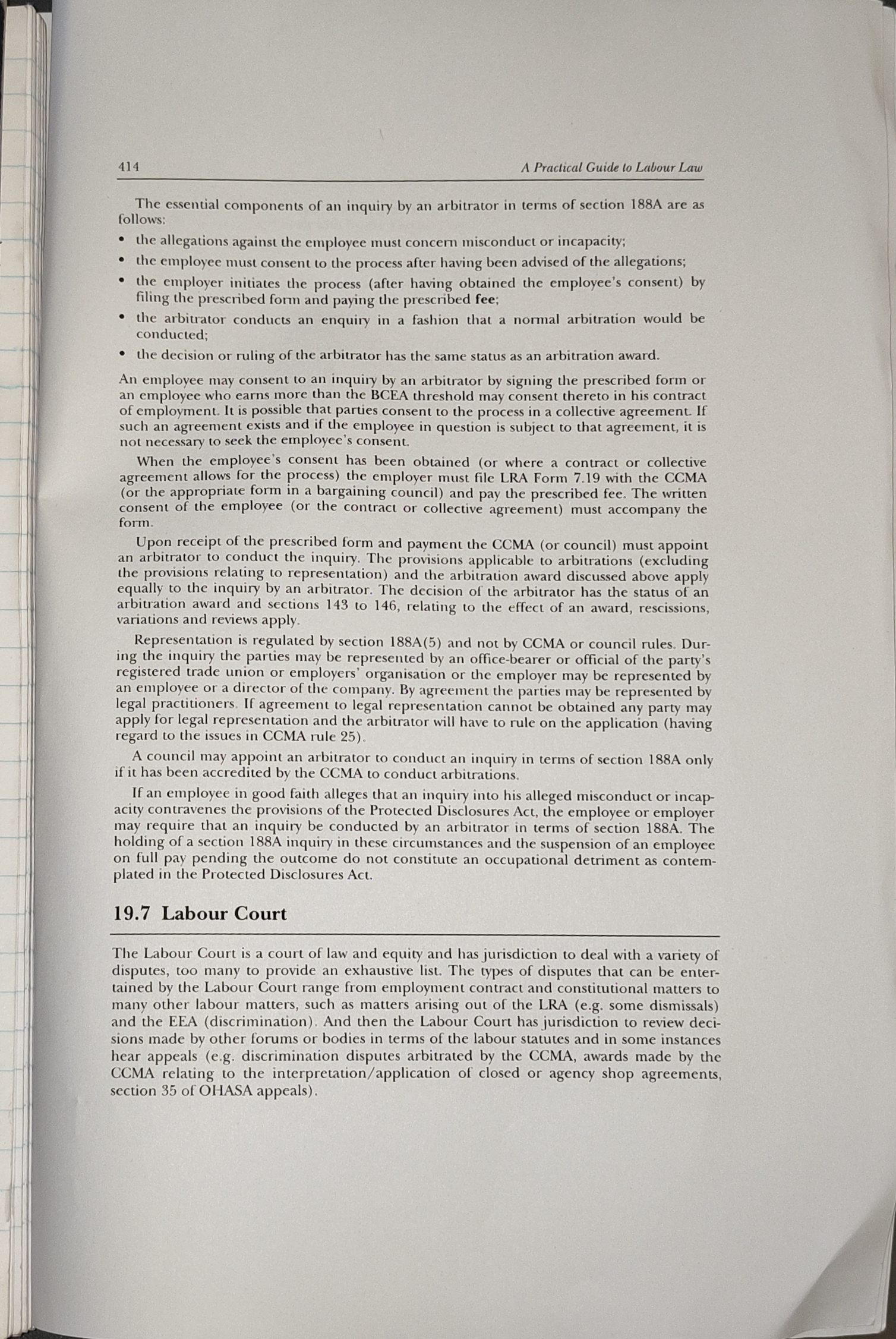
Components of Inquiry by an Arbitrator (Section 188A)
-
Allegations of Misconduct or Incapacity:
The inquiry focuses on allegations that must be serious enough to involve either misconduct or incapacity. This sets the foundation for a formal review, ensuring that only relevant issues are examined. -
Employee Consent:
The employee must be made aware of the allegations and consent to the inquiry process. This highlights the importance of transparency and fairness in labor relations, granting employees a degree of control over proceedings affecting their employment. -
Employer Initiation:
The employer is responsible for initiating the inquiry after obtaining the employee's consent and paying the required fees. This underscores the employer's role in not only enforcing standards but also adhering to legal frameworks. -
Conduct of Inquiry:
The arbitrator must conduct the inquiry similarly to a regular arbitration, emphasizing the need for professionalism and adherence to legal standards during the process. -
Decision Status:
The ruling made by the arbitrator is equated to an arbitration award, giving it legal weight. This ensures that decisions are binding and enforceable, thus providing closure to disputes.
Employee Consent Process
- Consent Methods:
Employees can consent through prescribed forms, and it's essential for employers to be aware that if a collective agreement exists, they might not need to seek further consent. This streamlines the process and minimizes bureaucratic delays.
CCMA's Role
-
Appointment of Arbitrators:
The employer must file specific forms (LRA Form 7.19) with the CCMA to appoint an arbitrator. This procedural requirement ensures that all parties are informed and involved. -
Representation During Inquiry:
Various representatives can be involved during the inquiry, including officials from unions or employers’ organizations, highlighting the collaborative nature of labor relations. Legal representation can further ensure fairness, though it may also introduce complexity and costs.
Labour Court
-
Jurisdiction:
The Labour Court addresses a wide range of disputes, indicating its pivotal role in labor law. It handles disputes related to employment contracts, constitutional matters, and discrimination issues. -
Hearing Appeals:
The court has the jurisdiction to review decisions made by other bodies, including the CCMA. This provides a secondary layer of oversight, reinforcing the system of checks and balances within labor law.
Summary
Understanding the intricacies of Section 188A and the Labour Court's functions is essential for navigating labor disputes. This framework not only ensures compliance with legal standards but also protects the rights of employees and employers alike. Awareness of these processes equips stakeholders with the necessary tools to effectively resolve conflicts in the workplace.
Extended readings:
Dispute Resolution Overview
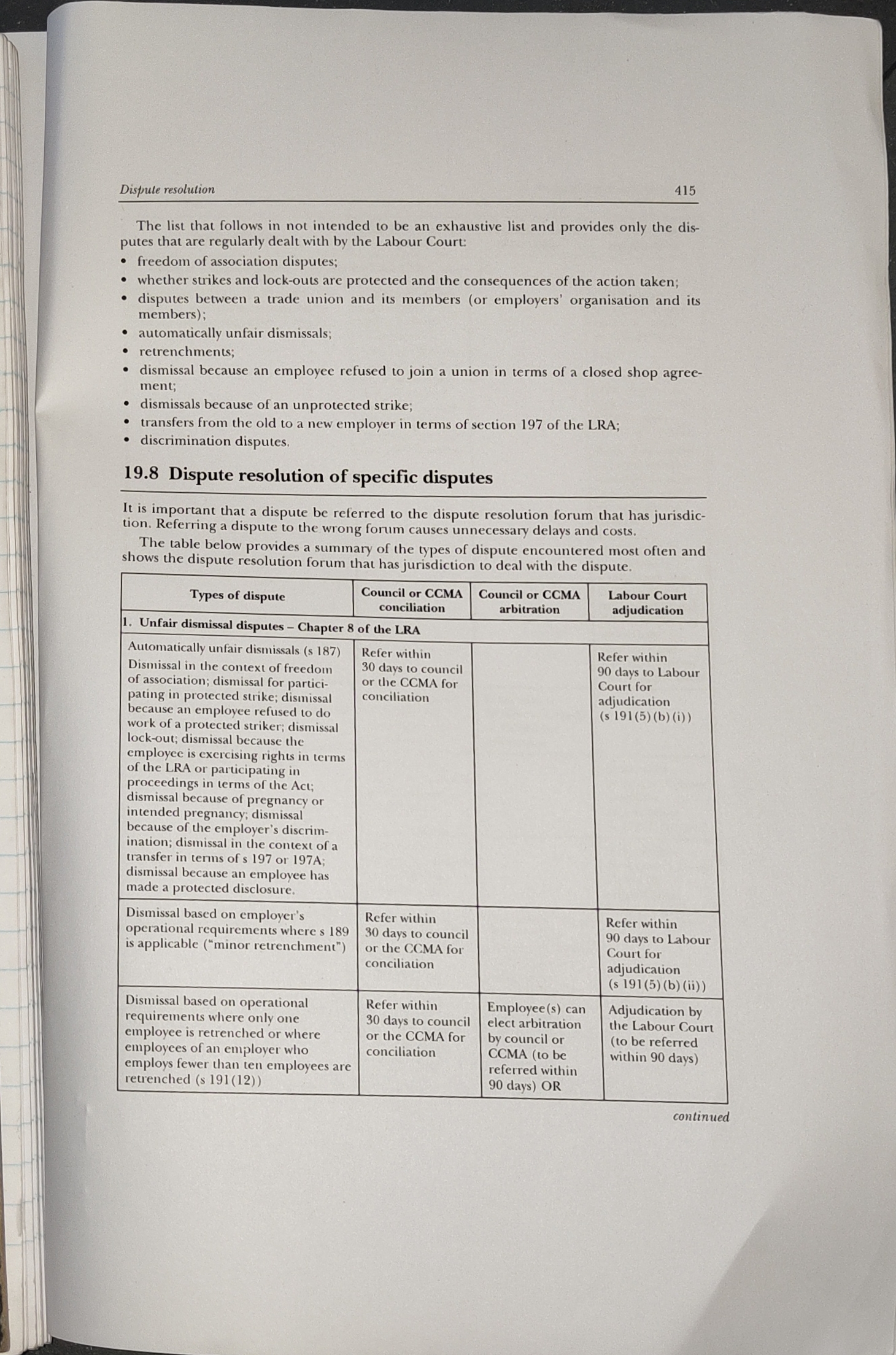
Key Points
-
Nature of Disputes:
- The document highlights various types of labor disputes that the Labour Court regularly addresses, including association disputes, unfair dismissals, and discrimination claims. Understanding these categories is essential for employees and employers as it affects how each case is navigated legally.
-
Importance of Jurisdiction:
- It's critical to refer disputes to the appropriate resolution forum. Using the wrong forum can lead to unnecessary delays and increased costs, emphasizing the need for proper guidance in dispute resolution processes.
-
Specific Disputes:
- The text outlines specific dispute types and the respective procedures for resolution, differentiating between conciliation by the CCMA and adjudication by the Labour Court. This provides clarity on how to proceed based on the nature of the dispute.
Table of Dispute Types and Resolution Methods
| Types of Dispute | Council or CCMA Conciliation | Council or CCMA Arbitration | Labour Court Adjudication |
|---|---|---|---|
| 1. Unfair dismissal disputes – Chapter 8 of the LRA | |||
| Automatically unfair dismissals (s 187) | Refer within 30 days to council or CCMA for conciliation | - | Refer within 90 days for adjudication (s 191(5)(b)(i)) |
| Dismissal based on employer’s operational requirements (s 189) | Refer within 30 days to council or CCMA for conciliation | - | Refer within 90 days for adjudication (s 191(5)(b)(i)) |
| Dismissals based on operational requirements with fewer than 10 employees (s 191(12)) | Refer within 30 days to council or CCMA for conciliation | Employee(s) can elect arbitration by council or CCMA (to be referred within 90 days) | Adjudication by the Labour Court (to be referred within 90 days) |
Thoughts on the Table
-
Clarity in Procedure:
- The table presents a clear outline of the necessary steps for different types of disputes, which can help employees and employers understand their options clearly.
-
Time Sensitivity:
- The emphasis on specific time frames for referrals to councils or courts underlines the importance of prompt action in labor disputes. This can significantly affect the resolution outcome.
-
Arbitration Options:
- Notably, for disputes involving fewer employees, there is an option for arbitration which can be quicker and less formal than court proceedings, offering a more accessible resolution pathway.
Understanding these points and the table allows for better navigation of labor disputes, ensuring that the involved parties are aware of their rights and the processes available to them.
Extended readings: